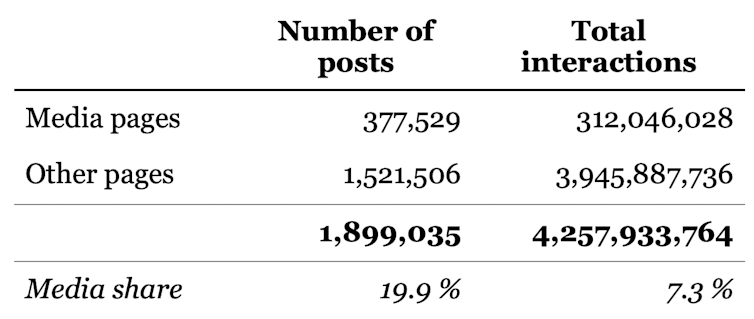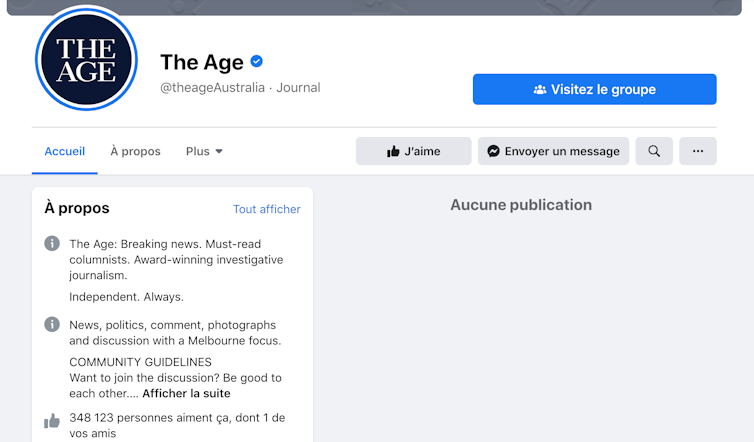Media
Facebook vs. Australia — Canadian media could be the next target for ban – The Conversation CA
Shortly after Facebook nuked news from its platform in Australia, I spent an hour on the phone with Kevin Chan, head of public policy for Facebook, Inc., in Canada.
He told me he’s “working really hard to prevent that outcome in Canada.” In other words, if Ottawa follows Australia and tables a bill forcing tech giants to share revenue with the news business, Facebook would drop the A-bomb on Canadian journalism as well.
Chan would prefer to work out partnerships with Canadian journalism. He said Facebook gave $10 million to various news projects in the past four years. He pledged “in 2021, we’ll do quite a bit more.” But don’t put a gun to our head, he basically said, or we’ll fight back.
Render unto Caesar
I actually share many of Chan’s views. Here’s one. Last fall, the lobby group representing the news industry in Canada published a report Levelling the Digital Playing Field that contends a law similar to Australia’s would garner $620 million per year in Canada. It also says “such a pathway would make up for much of [our] revenue decrease,” implying that the web giants somehow divert advertising dollars from the news business.
This premise is false. What actually happened is that Google and Facebook have much better adapted to the digital era the business model that helped legacy media thrive in the analogue era, when print and the airwaves ruled the world.


(Washington Post), Author provided
A quote from The Washington Post Company’s 1972 annual report sums it well: “… a quality product to our audience and a quality audience to our advertisers …” Newspapers and broadcasters were attention merchants. They’ve been spectacularly upstaged by the web behemoths.
Four out of every five dollars Google earns are ad dollars. In the case of Facebook, it’s 98 per cent! In 2020, their advertising revenues represented a formidable $310 billion worldwide, including $7.6 billion in Canada alone.


(Data from Facebook and Google annual reports, and the Canadian Media Concentration Research Project), Author provided
Journalism is worth something
While I applaud their success, Google and more critically Facebook must in turn acknowledge some of that success rests on the shoulders of others. The attention they sell ads with is generated, in part, by news content. I asked Chan, how much. “Zero,” he answered. The value, to Facebook, is in the social link. “It is not true that news has value for Facebook.”
And this is where we diverge. In the scholarly journal About Journalism, Tristan Mattelard documented, play by play, how Facebook courted news organizations in order to attract quality content on its burgeoning platform.
Last fall, I estimated 5.3 per cent of Facebook ad revenues between Jan. 1, 2018, and June 30, 2020, had been generated thanks to news content. I’ve repeated the exercise during the past weeks, but with a larger sample of 1.9 million posts published in 2020 on Facebook pages administered in Canada.


(Data from CrowdTangle), Author provided
There’s a lot of news on Facebook. Just short of 20 per cent of all posts in my sample were from media pages, from CTV News to the Lake Cowichan Gazette. But news is Facebook’s broccoli. It drives far less interactions than the viral content usually found on the platform.
Only 7.3 per cent of the total interactions in my sample was from media pages. I apply this more reasonable proportion to Facebook’s advertising revenue in order to estimate that Mark Zuckerberg’s company made $210 million thanks to Canadian journalism in 2020.
I acknowledge this figure is an imperfect estimate. It is based on the few data Facebook allows researchers to access. But it is the least imperfect one. When asked by a La Presse journalist about it, Chan said my methodology was based on “incorrect hypotheses,” making my “conclusions erroneous.”
Chan told me Facebook doesn’t sell ads with content. More interactions don’t translate to more dollars. I understand that: if I read a Le Devoir article three times, it doesn’t bring in more advertising dollars. Facebook sells eyeballs.
Yet, those eyeballs turn to Facebook, in part, to know what goes on in their community, their province, their country. It’s in that sense that I don’t believe news has zero value to Facebook. Justin Osofsky, Facebook’s vice-president of global operations, wrote in 2013 that, “People come to Facebook to not only see and talk about what’s happening with their friends but also read news and discover what is going on in the world around them” (my emphasis).
A matter of power
Platforms feel the heat and respond by using a carrot or a stick. Google has chosen the carrot strategy and struck a deal with News Corp., Australia’s largest publisher. It is also actively working on similar partnerships with Canadian media. One Québec publisher I spoke with told me the deals could start in the summer of 2021 and translate into “millions” of dollars.
But it’s a poisoned carrot. What guarantee do we have that such partnerships will last without a legislative framework? In the small print of those deals, I saw a clause mentioning Google could pull the plug with a 90-day written notice.


(Author provided)
There’s a tremendous imbalance in power, here. On one side, two international companies whose combined revenues in 2020 was a little more than the GDP of New Zealand. On the other, media are being read like never before by Canadians — news publishers’ websites have seen their unique visitors increase 80 per cent between 2017 and 2020 — but their revenue keeps tanking in spite of their success. They are at a disadvantage when asking Facebook to transfer some of the revenue generated by Canadian journalism.
The Australian approach aims to correct that imbalance. The clash between Canberra and the platforms is a historic struggle between public interest and private interests. The public interest is one of journalism’s core values. I always tell my journalism students: “You’ll work in various organizations, but you’ll all work for the public.”
Asking Facebook to share its revenues is not an attack on the internet. Let’s remember Tim Berners-Lee warned us in 2010 that Facebook’s “walled garden” was a recipe for abuse. It isn’t a 20th-century remedy to a 21st-century problem either. It’s legislation to support an institution working in the public interest.
Facebook’s move in Australia is an abuse of private power to counter a public body acting in the public interest. If there was one reason for Canada to follow Australia’s lead, that would be it.
Media
Taylor Swift's new album apparently leaks, causing social media chaos – CBC News
The hype for Taylor Swift’s new album went into overdrive as it appeared to leak online two days ahead of its Friday release.
Swifties started sharing tracks on X that they claimed were from the singer’s upcoming album, The Tortured Poets Department, saying they came from a Google Drive link containing all 17 songs.
Some fans were upset by the leak and said they would wait until Friday to listen while others started frantically posting fake links on X to bury the “real” tracks.
“Raise your hand if ur an ACTUAL Taylor Swift fan and aren’t listening to leaks,” one user wrote.
Several media outlets reported that X briefly blocked the search term “Taylor Swift leak” on Wednesday.
CBC has reached out to Swift’s publicist for comment.
Swift announced the release, her 11th studio album and the first with all new songs since 2022’s Midnights, at the Grammy Awards ceremony in February.
Fans have been speculating about the lyrical themes that would appear on The Tortured Poets Department, based in part on a physical “library installation” that opened Tuesday in Los Angeles, curated with items that drop hints and references to the inspirations behind the album.
Swift’s 2022 album Midnights, which featured the hit Anti-Hero, also leaked online ahead of its scheduled release date, and went on to win the Grammy for album of the year. Swift’s previous albums 1989, Reputation and Lover also leaked ahead of their official releases.
The singer is in the midst of her billion-dollar-grossing Eras tour, which is moving through the U.S. and is scheduled to conclude in Vancouver in December.
Swift was added to Forbes magazine’s annual new billionaires list earlier this month, with Forbes saying she was the first musician to become a billionaire based solely on her songs and performances.
Media
DJT Stock Jumps. The Truth Social Owner Is Showing Stockholders How to Block Short Sellers. – Barron's
[unable to retrieve full-text content]
DJT Stock Jumps. The Truth Social Owner Is Showing Stockholders How to Block Short Sellers. Barron’s





Source link
Media
Taylor Swift's new album allegedly 'leaked' on social media and it's causing a frenzy – CTV News


Social media can be a divisive place, but even more so when it comes to Taylor Swift.
A Google Drive link allegedly containing 17 tracks that are purportedly from Swift’s eagerly awaited “The Tortured Poets Department” album has been making the rounds on the internet in the past day and people are equal parts mad, sad and happy about it.
CNN has reached out to Swift’s representative for comment.
The actual album is slated to drop at midnight Friday, but the claimed leak is both being hailed and nailed by Swift’s supporters.
One person shared a drawing of a young woman asleep in a sparkly bed with sparkly blankets on X, writing, “How I slept last night knowing I’m going to hear TTPD for the very first time tonight cause I haven’t listened to any leaks.”
Yet another person posted a video of two models walking and wrote, “Me and my bestie on our way to listen to #TSTTPD leaks.”
On Thursday, “Taylor Swift leaks” was a prevented search phrase on X.
The general consensus among those who have decided to be “leak free” appears to be that they are the true Swifties – as her hard core fan base is known – because they don’t believe the singer would have sanctioned such a “leak.”
Swift herself has gone to great lengths to prevent unintended early releases in the past.
“I have a lot of maybe, maybe-not-irrational fears of security invasion, wiretaps, people eavesdropping,” Swift said of her music during an 2014 appearance on” Jimmy Kimmel Live.” She added that her “1989” album only existed on her phone, “covered in cat stickers and the volume buttons don’t work very well because there’s candy stuck in there,” for nearly two years.
“The Tortured Poets Department” is Swift’s 11th album and comes after she became the first woman and only solo artist to win the Grammy for album of the year three times.
-



 Science8 hours ago
Science8 hours agoJeremy Hansen – The Canadian Encyclopedia
-



 Investment8 hours ago
Investment8 hours agoUK Mulls New Curbs on Outbound Investment Over Security Risks – BNN Bloomberg
-



 Tech8 hours ago
Tech8 hours agoSave $700 Off This 4K Projector at Amazon While You Still Can – CNET
-



 Tech6 hours ago
Tech6 hours ago'Kingdom Come: Deliverance II' Revealed In Epic New Trailer And It Looks Incredible – Forbes
-



 Sports6 hours ago
Sports6 hours agoAuston Matthews denied 70th goal as depleted Leafs lose last regular-season game – Toronto Sun
-



 Health22 hours ago
Health22 hours agoSupervised consumption sites urgently needed, says study – Sudbury.com
-
Real eState7 hours ago
Sick of Your Blue State? These Real Estate Agents Have Just the Place for You. – The New York Times
-
News21 hours ago
Canada's 2024 budget announces 'halal mortgages'. Here's what to know – National Post




